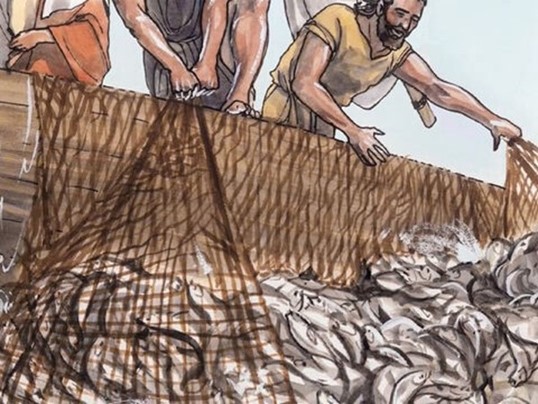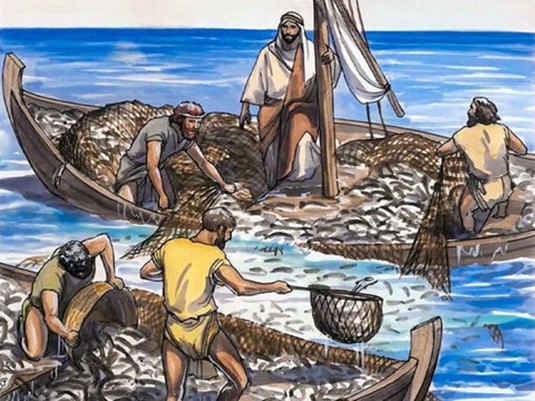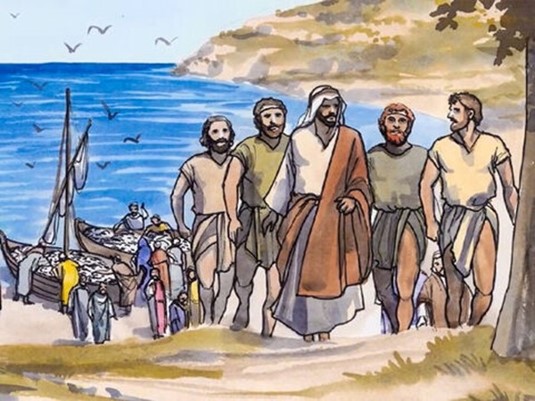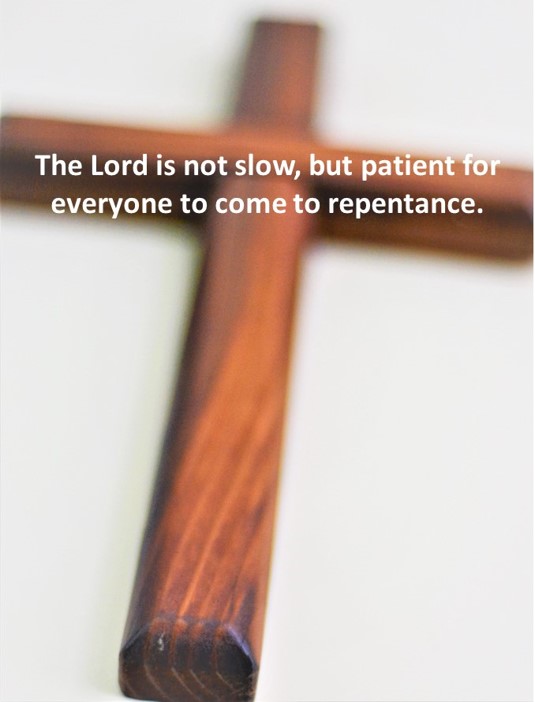Good morning!
Greetings in the name of the Father, the son, and the Holy Spirit.
Once again, the kingdom of heaven is like a net that was let down into the lake and caught all kinds of fish. When it was full, the fishermen pulled it up on the shore. Then they sat down and collected the good fish in baskets, but threw the bad away. This is how it will be at the end of the age. The angels will come and separate the wicked from the righteous and throw them into the blazing furnace, where there will be weeping and gnashing of teeth. (Matthew 13:47-50)

Let me tell you a story that takes us deep into the heart of one of Jesus’ parables, found in Matthew 13:47-50. Picture a large net cast into the sea, pulling in all kinds of fish. Some are good, some are not. The fishermen don’t know exactly what they’ve caught until they bring the net ashore. Then, they sit down, carefully sort through their catch, keeping the good fish and throwing away the bad. This image is not just about fishing—it’s about life, about how each of us is part of this great gathering, and how one day we will all be sorted, like those fish in the net.
Jesus uses this parable to illustrate something profound: God’s mercy is patient and waiting, but there will come a time when the net is full and everything must be brought to shore. We don’t know exactly when that time will come, either for the world or for ourselves. But we know it will happen, and when it does, we will face a judgment that goes far beyond anything we’ve experienced on this earth.
Many of us, at some point, have asked the question: Why do bad things happen to good people? We look at our circumstances, we see suffering, and we can’t help but wonder about fairness. The problem is, we often ask this question with an assumption—that we are the good people. But Jesus, even though He was the perfect teacher, once refused to be called good. He said, No one is good—except God alone (Luke 18:19). This tells us something profound: no human being is truly good by their own merit. We only measure ourselves against others, often based on fleeting moments, and we conclude that we are better or worse than those around us. But God’s judgment is not based on these human comparisons.
God is not quick to judge, and He waits for the right time. He doesn’t ask us to be perfect—He asks us to return to Him. One of the most beautiful examples of this is the story of the robber on the cross beside Jesus. With no time to redeem his past, no works to offer, this man simply asked Jesus to remember him. And what was Jesus’ response? Truly I tell you, today you will be with me in paradise (Luke 23:43). The robber’s salvation wasn’t based on being more righteous than the other thief—it was based on his humble plea for mercy. God had been waiting for him, and accepted him just as He waits for each of us.

God’s Patience and Mercy
The parable of the net, found in Matthew 13:47-50, gives us a profound picture of God’s patience and mercy. In this story, Jesus describes a net being cast into the sea, gathering all kinds of fish. The net isn’t immediately pulled to shore; it remains in the water, allowing more and more fish to be caught. Only when the net is full do the fishermen draw it up, separating the good fish from the bad. This image represents the final judgment, but it also illustrates God’s patient and merciful nature. He waits until the time is right, giving everyone a chance to respond to His grace.
God’s patience is further explained in 2 Peter 3:9, which says, *The Lord is not slow in keeping his promise, as some understand slowness. Instead, he is patient with you, not wanting anyone to perish, but everyone to come to repentance.” This verse helps us understand that God’s delay in judgment is not a sign of inaction, but rather an act of profound mercy. He is giving people time to turn back to Him, to repent, and to embrace the gift of salvation that is offered through Jesus Christ. God’s ultimate desire is not to condemn, but to save, and His patience reflects His deep love for all humanity.
We often find ourselves asking, “Why does God allow bad things to happen?” or “Why doesn’t He act now to put an end to evil?” The truth is that God’s patience allows time for more people to experience His mercy. If judgment were to come immediately, how many would be ready? God doesn’t rush to judgment because He is not in a hurry to punish; instead, He is waiting for people to return to Him. Every day that passes is another opportunity for someone to come to know His love.
But what does it mean to return to God? It’s not about proving our righteousness or making ourselves worthy of His forgiveness. The story of the robber on the cross beside Jesus illustrates this beautifully. In Luke 23:39-43, we see two men hanging next to Jesus. One mocks Him, while the other humbly asks, “Jesus, remember me when you come into your kingdom.” Jesus’ response is astonishing: “Truly I tell you, today you will be with me in paradise.” This robber had no time to make amends for his past or prove his worth. He simply acknowledged his need for mercy and placed his hope in Jesus.
This is what God asks of us. We are not required to be perfect or to achieve some standard of righteousness on our own. We are simply called to come to Him in humility, recognizing that we need His grace. Like the net in the parable, God’s mercy is waiting, ready to gather us in. Psalm 103:8 reminds us, The Lord is compassionate and gracious, slow to anger, abounding in love. He is patient, not because He is indifferent, but because He longs for us to turn to Him.
As we live in this time of waiting, we should remember that every day is an expression of God’s mercy. It is His invitation to all of us to come home, to receive His love, and to be gathered into His eternal kingdom.

The Time Will Come for Judgment
While God is patient and merciful, the parable of the net in Matthew 13:47-50 reminds us that there will come a time when judgment is inevitable. In the parable, the fishermen pull the net to shore once it is full. They sit down and begin the process of separating the good fish from the bad. As Jesus explains, The angels will come and separate the wicked from the righteous and throw them into the blazing furnace, where there will be weeping and gnashing of teeth (Matthew 13:49-50). This vivid imagery leaves no doubt that a day of reckoning is coming, when God will separate those who have embraced His mercy from those who have rejected it.
This final judgment is both a collective event at the end of time, when Christ returns to judge the living and the dead, and a personal moment when each of us faces God at the end of our lives. On that day, we will give an account of our lives, not based on how we compare to others, but based on our relationship with God and whether we have accepted His offer of salvation through Jesus Christ. Hebrews 9:27 states, “Just as people are destined to die once, and after that to face judgment.”
The separation of the good fish from the bad, of the sheep from the goats, or the wheat from the weeds, is a theme that appears throughout Jesus’ teachings. In each of these parables, two groups are clearly distinguished: one that is saved and welcomed into God’s eternal kingdom, and another that is rejected and cast away. The reality of judgment is sobering, but it is also a necessary aspect of God’s justice.
However, here’s the critical point: we are not the ones who make this judgment. It is easy to fall into the trap of trying to determine who is righteous and who is not, but Scripture is clear that judgment belongs to God alone. In the parable of the wheat and the weeds, found earlier in Matthew 13:24-30, Jesus teaches that the wheat and weeds are allowed to grow together until the harvest. The servants want to pull up the weeds immediately, but the master says, No, because while you are pulling the weeds, you may uproot the wheat with them. Let both grow together until the harvest (Matthew 13:29). This teaches us a profound truth: we do not always know who is truly following God and who is not.
Even the angels, who are purer and wiser than humans, do not make the final judgment. Only God knows the hearts of people, and He alone is qualified to separate the good from the bad. 1 Samuel 16:7 reminds us that, “The Lord does not look at the things people look at. People look at the outward appearance, but the Lord looks at the heart.” Our task, then, is not to judge but to trust in God’s perfect wisdom and timing.
We are living in a time of God’s patience, but we must not mistake this delay for inaction. The net will one day be pulled to shore, and the sorting will begin. As believers, we should live with a sense of urgency—not in fear, but in a desire to share the good news of God’s mercy with those around us. Judgment is real, but so is God’s offer of salvation. Our focus should be on proclaiming this good news, trusting that God will carry out His justice in the right time and in the right way.
Ultimately, our hope rests not in our own righteousness, but in the grace of God. We know that the judgment will come, but we also know that through Jesus Christ, we have been offered a way to be counted among the “good fish” and the “wheat.” As we live in this time of waiting, may we respond to God’s mercy by sharing His love with others and trusting Him to bring about His perfect judgment when the time comes.

What Should We Do?
So, what is our role in this time of waiting, knowing that the day of judgment will one day come? How should we live our lives in light of this knowledge? The answer lies in compassion, urgency, and the sharing of the Gospel. First and foremost, we are called to have deep compassion for those who do not yet know the gift of eternal life through Jesus Christ. This isn’t a call to look down on others or to act out of a sense of superiority, but rather to recognize that we ourselves are only saved by God’s grace.
We are tasked with sharing the good news of God’s mercy—the Gospel—with those who are unaware of it. In Matthew 28:19-20, Jesus gives His followers the Great Commission, saying, “Therefore go and make disciples of all nations, baptizing them in the name of the Father and of the Son and of the Holy Spirit, and teaching them to obey everything I have commanded you.” This is the primary mission for all believers: to spread the message of God’s love, forgiveness, and salvation. But this must come from a place of humility and love, recognizing that none of us deserve God’s mercy; it is a gift that He offers freely to everyone.
Our task, then, is to plant seeds, to share the truth of God’s love, and to live lives that reflect His mercy and grace. Hebrews 7:25 reminds us that “Jesus is able to save completely those who come to God through him, because he always lives to intercede for them.” This is an important reminder: it is Jesus who saves, not us. We are simply His messengers, called to share the Gospel with urgency and love, but the transformation of hearts belongs to God.
Many of the people around us are searching for meaning, purpose, and hope. They may be highly educated, successful, or wise in the eyes of the world, but if they do not know Jesus, they are missing the most important truth. Romans 10:14 asks, “How, then, can they call on the one they have not believed in? And how can they believe in the one of whom they have not heard? And how can they hear without someone preaching to them?” We are that “someone” who must share the message of Christ, not out of obligation, but because of the joy we have experienced through His grace.
This is why we must always be ready to share the Gospel, whether in our words, actions, or simply through living a life that reflects the love and truth of Christ. 1 Peter 3:15 instructs us, “Always be prepared to give an answer to everyone who asks you to give the reason for the hope that you have. But do this with gentleness and respect.” We do not force the message onto others, nor do we try to convert them out of fear. Instead, we offer the Gospel as a life-giving gift, with gentleness and respect, recognizing that it is only by God’s grace that we ourselves have been saved.
Even for those of us who already believe, we need to return to the Gospel again and again. The message of God’s mercy and grace is not something we hear once and then move on from. It is the foundation of our lives, and it is something we must continually remind ourselves of. We confront challenges, trials, and sufferings in this world, but the Gospel offers us the strength to endure. John 16:33 records Jesus saying, “In this world you will have trouble. But take heart! I have overcome the world.”
As we wait for the final judgment, we must live with an attitude of hope, knowing that Jesus has already won the victory. We must also live with a sense of urgency, knowing that there are people who still need to hear the message of salvation. But through it all, we trust that it is God who does the saving, and our role is to share the Good News, reflect His love, and point others to Christ.
Finally, let us not forget that we are also continually in need of God’s mercy. As we share the Gospel with others, we must allow the message to refresh our own hearts. Every day is a new opportunity to experience the love and grace of God, and to share that gift with the world.
Summary: The Cycle of God’s Mercy and Judgment
God’s mercy is vast, and His patience is beyond our understanding. He waits for us to return to Him, offering His forgiveness and love to anyone who seeks it. But there will come a time when the net is full, and judgment will follow. Just as the good fish are separated from the bad, so too will people be separated based on their relationship with God. This is why we must live with a sense of urgency, sharing the Gospel with compassion and love, knowing that salvation comes only from God.
In the end, it is not about our righteousness, but about our willingness to accept God’s mercy. Just like the robber on the cross, we don’t have to be perfect to receive God’s grace. We just have to come to Him in humility, trusting that His love is enough. And as we do, we are called to extend that same mercy to others, helping them see the love of God that has transformed our lives.
Let’s pray.
Heavenly Father, we thank You for Your mercy and patience. You wait for us with open arms, offering us the gift of eternal life through Your Son, Jesus Christ. Help us to live each day with the awareness of Your love and the urgency to share it with others. Give us hearts of compassion for those who do not yet know You, and empower us to speak Your truth with grace. We acknowledge that only You can save, and we trust in Your perfect timing. May we always be ready, knowing that one day, the net will be full, and we will stand before You. In Jesus’ name, we pray. Amen.

The Lord is not slow in keeping his promise, as some understand slowness. Instead, he is patient with you, not wanting anyone to perish, but everyone to come to repentance. (2 Peter 3:9)
